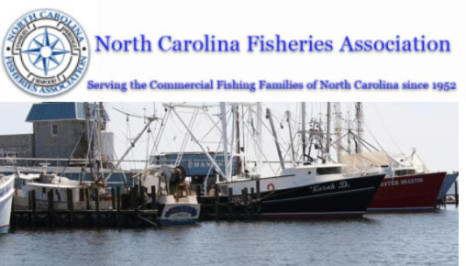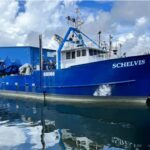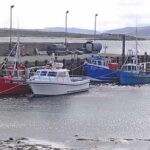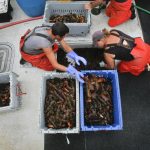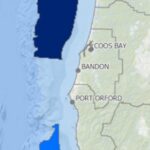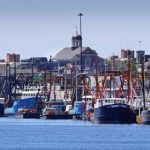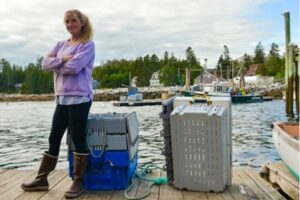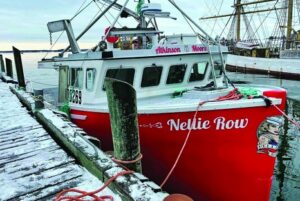Monthly Archives: March 2016
Lawsuit Challenges FDA’s Approval of Genetically Engineered Salmon
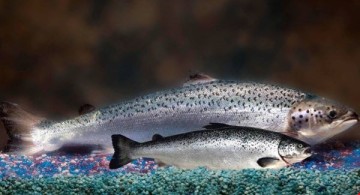 A coalition of environmental, consumer, and commercial and recreational fishing organizations has sued the Food and Drug Administration (FDA) for approving the first-ever genetically engineered (GE) food animal, an Atlantic salmon engineered to grow quickly. “FDA’s decision is as unlawful as it is irresponsible,” said George Kimbrell, senior attorney for Center for Food Safety and co-counsel for the plaintiffs. “This case is about protecting our fisheries and ocean ecosystems from the foreseeable harms of the first-ever GE fish, harms FDA refused to even consider, let alone prevent. But it’s also about the future of our food: FDA should not, and cannot, responsibly regulate this GE animal, nor any future GE animals, by treating them as drugs under a 1938 law.” Read the article, Click here 17:15
A coalition of environmental, consumer, and commercial and recreational fishing organizations has sued the Food and Drug Administration (FDA) for approving the first-ever genetically engineered (GE) food animal, an Atlantic salmon engineered to grow quickly. “FDA’s decision is as unlawful as it is irresponsible,” said George Kimbrell, senior attorney for Center for Food Safety and co-counsel for the plaintiffs. “This case is about protecting our fisheries and ocean ecosystems from the foreseeable harms of the first-ever GE fish, harms FDA refused to even consider, let alone prevent. But it’s also about the future of our food: FDA should not, and cannot, responsibly regulate this GE animal, nor any future GE animals, by treating them as drugs under a 1938 law.” Read the article, Click here 17:15
Specially Trained Environmental Conservation Dog Helps Catch Illegal Fishermen
 Four men are facing illegal fishing charges after Environmental Conservation police, with the help of a K-9 team, located 38 illegally caught striped bass hidden along the banks of the Housatonic River. The Department of Energy and Environmental Protection said that EnCon police received an anonymous complaint Tuesday about four people fishing in the Housatonic River off River Road who may have been illegally catching fish. Read the rest, Click here 14:26
Four men are facing illegal fishing charges after Environmental Conservation police, with the help of a K-9 team, located 38 illegally caught striped bass hidden along the banks of the Housatonic River. The Department of Energy and Environmental Protection said that EnCon police received an anonymous complaint Tuesday about four people fishing in the Housatonic River off River Road who may have been illegally catching fish. Read the rest, Click here 14:26
Pacific Islands moving away from vessel day scheme
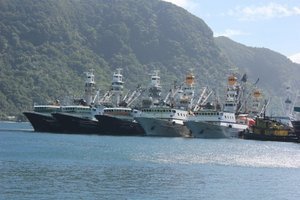 US tuna boat owners have decried the policy of the Pacific island countries which are party to the US South Pacific Tuna Treaty to charge for fishing days rather than the amount of fish caught under the treaty. The Parties to the Nauru Agreemen (PNA) , the grouping of countries with the largest exclusive economic zones where US purse seiners fish came up with the vessel day scheme promoting it as a more equitable way for the islands to be paid for their resource. While there’s an interim agreement in place for tuna boats to resume fishing in Pacific island waters,,Read the rest, click here 14:15
US tuna boat owners have decried the policy of the Pacific island countries which are party to the US South Pacific Tuna Treaty to charge for fishing days rather than the amount of fish caught under the treaty. The Parties to the Nauru Agreemen (PNA) , the grouping of countries with the largest exclusive economic zones where US purse seiners fish came up with the vessel day scheme promoting it as a more equitable way for the islands to be paid for their resource. While there’s an interim agreement in place for tuna boats to resume fishing in Pacific island waters,,Read the rest, click here 14:15
Larger expected king run loosens restrictions on setnets, drifters
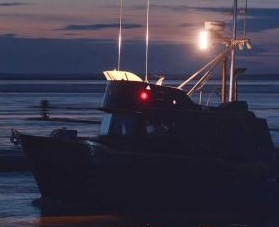 Commercial fishermen in Upper Cook Inlet will be somewhat freer to fish at the outset of the 2016 season thanks to a larger projected king salmon run. For the past few years, Alaska Department of Fish & Game commercial fisheries managers have had to work around restrictions on their fisheries because of low king salmon runs to the stream systems across Upper Cook Inlet. However, with a projected late-run return of 30,000 king salmon to the Kenai River and improved runs to the Deshka and Little Susitna rivers, managers will be able to operate under normal restrictions, according to the 2016 Upper Cook Inlet commercial salmon fisheries outlook. “This will be the first year we’ve had the luxury of operating those fisheries without the restrictions,” Read the article, click here 13:09
Commercial fishermen in Upper Cook Inlet will be somewhat freer to fish at the outset of the 2016 season thanks to a larger projected king salmon run. For the past few years, Alaska Department of Fish & Game commercial fisheries managers have had to work around restrictions on their fisheries because of low king salmon runs to the stream systems across Upper Cook Inlet. However, with a projected late-run return of 30,000 king salmon to the Kenai River and improved runs to the Deshka and Little Susitna rivers, managers will be able to operate under normal restrictions, according to the 2016 Upper Cook Inlet commercial salmon fisheries outlook. “This will be the first year we’ve had the luxury of operating those fisheries without the restrictions,” Read the article, click here 13:09
Final Monomoy National Wildlife Refuge plan still irks Chatham officials
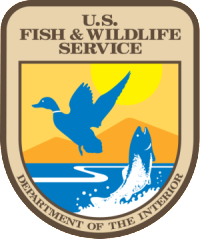 Town officials are considering possible litigation or legislative relief after the U.S. Fish & Wildlife Service on Wednesday released the final version of a new management plan for Monomoy National Wildlife Refuge, including a disputed claim that the federal government has the right to manage fisheries on the Nantucket Sound side of the island. “The town feels strongly that this is an example of federal overreach where there isn’t the logic or the need for it,” said Jeffrey Dykens, chairman of the Chatham Board of Selectmen. In its draft plans, the wildlife service claimed it has the right to regulate fisheries — and banned many types of traditional fishing gear — within a 3,000-acre area of ocean below the low-water mark. Read the rest here 10:25
Town officials are considering possible litigation or legislative relief after the U.S. Fish & Wildlife Service on Wednesday released the final version of a new management plan for Monomoy National Wildlife Refuge, including a disputed claim that the federal government has the right to manage fisheries on the Nantucket Sound side of the island. “The town feels strongly that this is an example of federal overreach where there isn’t the logic or the need for it,” said Jeffrey Dykens, chairman of the Chatham Board of Selectmen. In its draft plans, the wildlife service claimed it has the right to regulate fisheries — and banned many types of traditional fishing gear — within a 3,000-acre area of ocean below the low-water mark. Read the rest here 10:25
Tributes paid to “visionary” skipper and head of north-east fishing dynasty
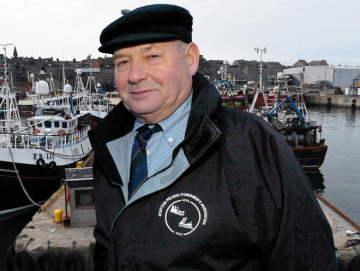 The head of a north-east fishing dynasty has been described as “visionary” who helped shape the modern industry after losing his brave battle with illness. Andrew Tait skippered his family’s vessels for four decades before becoming an ambassador and champion for the fleet. The 77-year-old – who was known to family and friends as “Andra” – was chairman of the Scottish Pelagic Fishermen’s Association (SPFA) for six years and spent almost his entire working life as one of its directors. And – along with brothers Willie and Robert – their pioneering decision to invest heavily in large purse-seine vessels to fish for herring and mackerel reaped huge dividends. Read the article here 08:44
The head of a north-east fishing dynasty has been described as “visionary” who helped shape the modern industry after losing his brave battle with illness. Andrew Tait skippered his family’s vessels for four decades before becoming an ambassador and champion for the fleet. The 77-year-old – who was known to family and friends as “Andra” – was chairman of the Scottish Pelagic Fishermen’s Association (SPFA) for six years and spent almost his entire working life as one of its directors. And – along with brothers Willie and Robert – their pioneering decision to invest heavily in large purse-seine vessels to fish for herring and mackerel reaped huge dividends. Read the article here 08:44
Dungeness crab finally arrives at SF docks
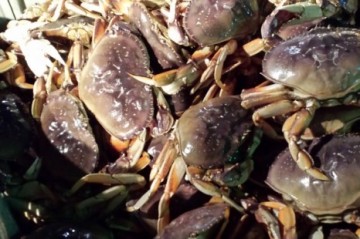 Seaworn crabbers began hitting the docks at Fisherman’s Wharf on Wednesday evening, their boats crawling with spindly hard-shelled Dungeness doomed to a future going down the gullets of hungry seafood lovers. But, judging by the first haul, crab season could be shortened dramatically by slim pickings. The first batch of crab in the long-delayed commercial season was brought in mostly by small boats — the big ones aren’t expected back until Thursday night — but seafood companies were eager to buy the tasty crustaceans. Video, Read the story here 08:00
Seaworn crabbers began hitting the docks at Fisherman’s Wharf on Wednesday evening, their boats crawling with spindly hard-shelled Dungeness doomed to a future going down the gullets of hungry seafood lovers. But, judging by the first haul, crab season could be shortened dramatically by slim pickings. The first batch of crab in the long-delayed commercial season was brought in mostly by small boats — the big ones aren’t expected back until Thursday night — but seafood companies were eager to buy the tasty crustaceans. Video, Read the story here 08:00
Louisiana Shrimpers Look To Technology To Increase Profits
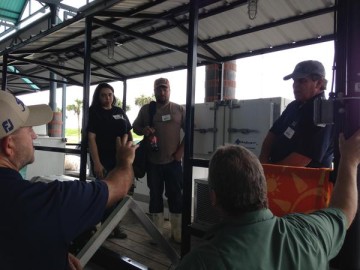 Bobby and Christine Lovell are shrimpers in St. Bernard Parish. It’s hard work and in the past they never knew how much money they were going to make. “A lot of people struggled last year with the price of the shrimp and they are still struggling today because the price… is so low,” says Lovell. Last year they decided to invest thousands of dollars into new technology for their boat. They bought a new flash freezer with the help of some grants. Much of the good shrimping happens in the fall, and last fall they were able to freeze their shrimp right away, so they could sell it whenever. Read the article here 07:08
Bobby and Christine Lovell are shrimpers in St. Bernard Parish. It’s hard work and in the past they never knew how much money they were going to make. “A lot of people struggled last year with the price of the shrimp and they are still struggling today because the price… is so low,” says Lovell. Last year they decided to invest thousands of dollars into new technology for their boat. They bought a new flash freezer with the help of some grants. Much of the good shrimping happens in the fall, and last fall they were able to freeze their shrimp right away, so they could sell it whenever. Read the article here 07:08
Spreading misinformation about our fisheries
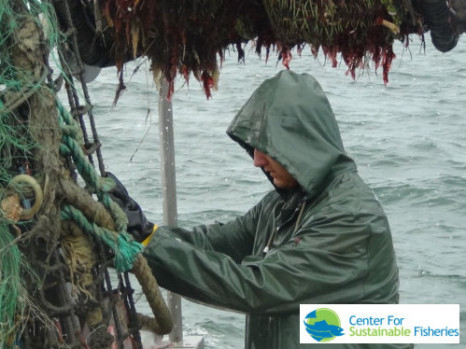 Anyone knowledgeable about the commercial fisheries of the United States will find nothing original in the op-ed piece recently submitted to the New York Times by the environmental organization Oceana. Even its title ‘A Knockout Blow for American Fish Stocks’ is misleading. American fish stocks are healthy. NOAA’S annual report to Congress, submitted at the end of 2014 showed that only twenty-six of the three hundred and eight fish stocks assessed were subject to overfishing. ‘Overfishing’ occurs when too many fish are removed from a population to produce maximum sustainable yield. As a scientific term it is quite misleading, carrying, as it does, the clear implication that low stock assessments result solely from fishing pressure; whereas ‘overfishing’ can result from a number of other factors, such as changes in water temperature or salinity, degraded habitat and increased predation. Read the article here 21:20
Anyone knowledgeable about the commercial fisheries of the United States will find nothing original in the op-ed piece recently submitted to the New York Times by the environmental organization Oceana. Even its title ‘A Knockout Blow for American Fish Stocks’ is misleading. American fish stocks are healthy. NOAA’S annual report to Congress, submitted at the end of 2014 showed that only twenty-six of the three hundred and eight fish stocks assessed were subject to overfishing. ‘Overfishing’ occurs when too many fish are removed from a population to produce maximum sustainable yield. As a scientific term it is quite misleading, carrying, as it does, the clear implication that low stock assessments result solely from fishing pressure; whereas ‘overfishing’ can result from a number of other factors, such as changes in water temperature or salinity, degraded habitat and increased predation. Read the article here 21:20
Coast Guard dewaters 2 sinking fishing boats, rescues crews off Massachusetts
 The U.S. Coast Guard says it rescued crews from two sinking fishing boats off the coast of Massachusetts. The Coast Guard said it responded to two separate rescue calls on Wednesday from boats that were taking on water. It says the first call came in around 4:30 a.m. from the vessel Silver Fox about seven miles southeast of Monomoy Island. Crews arrived with dewatering pumps and escorted Silver Fox to Hyannis Harbor by 9 a.m. Meanwhile, a call came in around 6:45 a.m. from the crew of Christina Eleni near Gloucester Harbor. Crews brought Christina Eleni to the Gloucester state fish pier safely. Read the rest here, – watch video here 20:45
The U.S. Coast Guard says it rescued crews from two sinking fishing boats off the coast of Massachusetts. The Coast Guard said it responded to two separate rescue calls on Wednesday from boats that were taking on water. It says the first call came in around 4:30 a.m. from the vessel Silver Fox about seven miles southeast of Monomoy Island. Crews arrived with dewatering pumps and escorted Silver Fox to Hyannis Harbor by 9 a.m. Meanwhile, a call came in around 6:45 a.m. from the crew of Christina Eleni near Gloucester Harbor. Crews brought Christina Eleni to the Gloucester state fish pier safely. Read the rest here, – watch video here 20:45
New Zealand: Jamie Briggs calls for seal cull in Coorong and Lower Lakes
Politicians and council mayors have called for the state government to act on the exploding 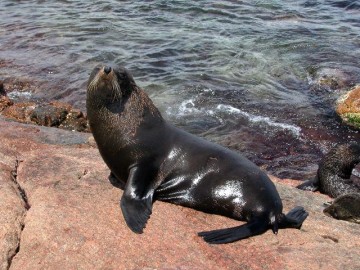 population New Zealand fur seal in the Coorong and Lower Lakes. Federal Member for Mayo Jamie Briggs wrote to minister Jay Weatherill asking for the state government to consider population management of seals because of the impact on commercial fishing operators. “While I appreciate it is a difficult political decision to engage in population management, I believe the time has arrived where this must be undertaken,” Mr Briggs said. He said the sustainability of businesses and the local environment were at risk. Read the rest here 17:05
population New Zealand fur seal in the Coorong and Lower Lakes. Federal Member for Mayo Jamie Briggs wrote to minister Jay Weatherill asking for the state government to consider population management of seals because of the impact on commercial fishing operators. “While I appreciate it is a difficult political decision to engage in population management, I believe the time has arrived where this must be undertaken,” Mr Briggs said. He said the sustainability of businesses and the local environment were at risk. Read the rest here 17:05
Lobster Boat Passes from One Generation to the Next in Friendship
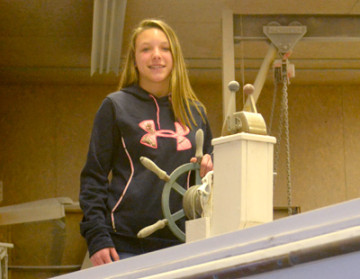 A lobster boat with a long history of plying the waters around the Friendship peninsula will stay in the fishing community, changing hands from one generation to another, thanks to a generous donation. Bill Ambrose, of North Yarmouth, the boat’s previous owner and a frequent visitor to his family’s cottage in Friendship, wanted to pass his historic fishing vessel, Caroline, on to a young lobsterman. Bill Ambrose passed away in September 2015 at the age of 77, from pancreatic cancer. Prior to his passing, he met Taylah Reed, a freshman at Medomak Valley High School, through Reed’s grandfather, Henry Thompson Sr. Read the rest here 14:36
A lobster boat with a long history of plying the waters around the Friendship peninsula will stay in the fishing community, changing hands from one generation to another, thanks to a generous donation. Bill Ambrose, of North Yarmouth, the boat’s previous owner and a frequent visitor to his family’s cottage in Friendship, wanted to pass his historic fishing vessel, Caroline, on to a young lobsterman. Bill Ambrose passed away in September 2015 at the age of 77, from pancreatic cancer. Prior to his passing, he met Taylah Reed, a freshman at Medomak Valley High School, through Reed’s grandfather, Henry Thompson Sr. Read the rest here 14:36
Number of NH groundfishermen continues to decline
 The number of New Hampshire boats fishing for groundfish has continued to decline, with only five full-time groundfishermen left in the state. Fishermen have been catching haddock, cod and flounder off the coast and selling it in New Hampshire for centuries. But fishermen said that quotas and regulations over the past decade that are meant to protect groundfish have made it almost impossible to make a living. The regulations have also affected other fishermen. At Tuesday’s regional meeting of the New England Fishery Management Council, some complained they were unable to catch herring to use as bait because they were in the same area as regulated groundfish. Video, Read the rest here 13:08
The number of New Hampshire boats fishing for groundfish has continued to decline, with only five full-time groundfishermen left in the state. Fishermen have been catching haddock, cod and flounder off the coast and selling it in New Hampshire for centuries. But fishermen said that quotas and regulations over the past decade that are meant to protect groundfish have made it almost impossible to make a living. The regulations have also affected other fishermen. At Tuesday’s regional meeting of the New England Fishery Management Council, some complained they were unable to catch herring to use as bait because they were in the same area as regulated groundfish. Video, Read the rest here 13:08
Athearn Marine Agency Boat of the Week: 37′ Repco Lobster boat Cat 3208T
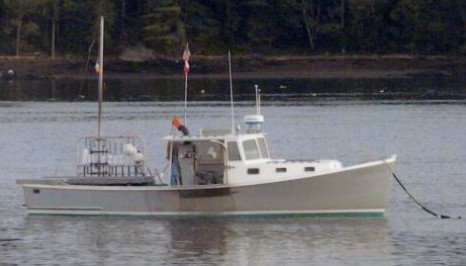 Specifications, information and 7 photo’s click here To see all the boats in this series, Click here 11:39
Specifications, information and 7 photo’s click here To see all the boats in this series, Click here 11:39
A Maine lobster fishing community confronts their changing climate
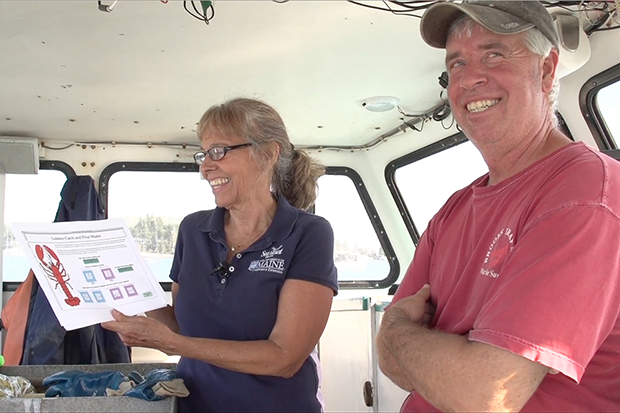 Over the past 40 years, some lobstermen in South Thomaston, Maine, say that they could “set their watches” by the start of the lobster shedding event each season. In 2012, though, extreme warm ocean temperatures—an ocean heat wave—combined with early and repeated lobster shedding. The obvious changes in lobsters during this event galvanized many lobstermen to take the impacts of climate change seriously. More than 127 million pounds of lobsters were caught in 2012—an increase of approximately 18 million pounds over 2011, but prices for the larger-than-expected catch were the second-lowest on record—second only to the Great Depression year of 1939. The price drop caused hardship and anguish in the lobstering community and beyond. Video, Read the rest here 10:55
Over the past 40 years, some lobstermen in South Thomaston, Maine, say that they could “set their watches” by the start of the lobster shedding event each season. In 2012, though, extreme warm ocean temperatures—an ocean heat wave—combined with early and repeated lobster shedding. The obvious changes in lobsters during this event galvanized many lobstermen to take the impacts of climate change seriously. More than 127 million pounds of lobsters were caught in 2012—an increase of approximately 18 million pounds over 2011, but prices for the larger-than-expected catch were the second-lowest on record—second only to the Great Depression year of 1939. The price drop caused hardship and anguish in the lobstering community and beyond. Video, Read the rest here 10:55
LIFO (Last in-First out) numbers need a closer look: economist
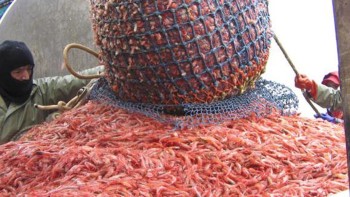 Debate around the last in, first out (LIFO) policy for the allocation of shrimp quotas rages, even as the Department of Fisheries and Oceans begins to re-evaluate applying its quota cuts to inshore fishermen before any larger, year-round enterprises. At the Comfort Inn in St. John’s Tuesday afternoon, made a presentation at a gathering of the St. John’s Board of Trade, saying more study would help any facts-based debate and decision-making around LIFO. He told his audience, based on figures available, he would expect the province’s GDP to fall $540 for every tonne of shrimp transferred from the year-round fleet to the inshore fishery. Read the rest here 09:20
Debate around the last in, first out (LIFO) policy for the allocation of shrimp quotas rages, even as the Department of Fisheries and Oceans begins to re-evaluate applying its quota cuts to inshore fishermen before any larger, year-round enterprises. At the Comfort Inn in St. John’s Tuesday afternoon, made a presentation at a gathering of the St. John’s Board of Trade, saying more study would help any facts-based debate and decision-making around LIFO. He told his audience, based on figures available, he would expect the province’s GDP to fall $540 for every tonne of shrimp transferred from the year-round fleet to the inshore fishery. Read the rest here 09:20
Strong sockeye run for Upper Cook Inlet, weaker run for Lower Cook Inlet
 The Upper Cook Inlet commercial fishing industry will see a spike in sockeye salmon harvest this year, if the Alaska Department of Fish & Game’s forecast holds true. Fish & Game forecast a total of 7.1 million sockeye salmon to return to the Upper Cook Inlet streams and rivers, with 4.1 million allocated to commercial harvest. That number is about 1.1 million more than the 20-year average and about 1 million more than the total commercial harvest in 2015. Most of the increase will be fish headed for the Kenai River, which will see approximately one million more sockeye salmon than the 20-year average, according to Fish & Game’s forecast. Read the rest here 08:27
The Upper Cook Inlet commercial fishing industry will see a spike in sockeye salmon harvest this year, if the Alaska Department of Fish & Game’s forecast holds true. Fish & Game forecast a total of 7.1 million sockeye salmon to return to the Upper Cook Inlet streams and rivers, with 4.1 million allocated to commercial harvest. That number is about 1.1 million more than the 20-year average and about 1 million more than the total commercial harvest in 2015. Most of the increase will be fish headed for the Kenai River, which will see approximately one million more sockeye salmon than the 20-year average, according to Fish & Game’s forecast. Read the rest here 08:27
A “Shotgun Start”: Bay Area crab fisherman race out to sea
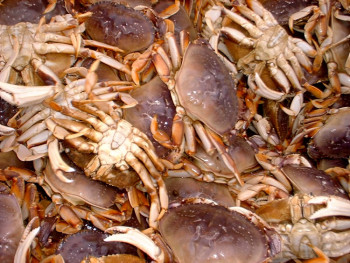 Commercial fishermen raced to their boats and headed out to sea to catch Dungeness crab Tuesday after a few caught Saturday and tested over the weekend passed a quality test. Fresh crab should reach markets by Thursday, according to one major processor in San Francisco. “It was a shotgun start,” said Larry Collins, president of the Crab Boat Owners Association in San Francisco. “We ran out of the hall and jumped on the boats once we got the price.” Crabs that were caught Saturday were tested yesterday for quality on Monday. Read the rest here 16:07
Commercial fishermen raced to their boats and headed out to sea to catch Dungeness crab Tuesday after a few caught Saturday and tested over the weekend passed a quality test. Fresh crab should reach markets by Thursday, according to one major processor in San Francisco. “It was a shotgun start,” said Larry Collins, president of the Crab Boat Owners Association in San Francisco. “We ran out of the hall and jumped on the boats once we got the price.” Crabs that were caught Saturday were tested yesterday for quality on Monday. Read the rest here 16:07
North Carolina Fisheries Association Weekly Update for March 28, 2016
Click here to read the Weekly Update, to read all the updates, Click here 13:14
Deadliest Catch Roundup – Season 12 – Various articles leading up to tonight’s Season Premier
 ‘Deadliest Catch’ Returns With A New Captain And A Life-Threatening Emergency At Sea Click here – ‘Deadliest Catch’ Sneak Peek: Meet the Newest Captain! Click here – A look inside the ‘Deadliest Catch’ Click for video Deadliest Catch’s Hansen says survival was a coin toss Click here Meet the youngest captain ever to appear on ‘Deadliest Catch’ Click here INTERVIEW: Capt. Johnathan Hillstrand readies for big storms on ‘Deadliest Catch’ Click here 11:23
‘Deadliest Catch’ Returns With A New Captain And A Life-Threatening Emergency At Sea Click here – ‘Deadliest Catch’ Sneak Peek: Meet the Newest Captain! Click here – A look inside the ‘Deadliest Catch’ Click for video Deadliest Catch’s Hansen says survival was a coin toss Click here Meet the youngest captain ever to appear on ‘Deadliest Catch’ Click here INTERVIEW: Capt. Johnathan Hillstrand readies for big storms on ‘Deadliest Catch’ Click here 11:23
Open Letter to Presidential Candidates on Saving the Oceans: Industrial Fishing Must Be Banned to Stave Off Wholesale Disaster
 Danny Quintana, founder of the Global High Seas Marine Preserve, is making a direct plea to the Presidential Candidates to take up an issue that is vital to the survival of billions around the world. While the job of altering the existence of national life globally to stave off climate change is in full swing, the task that will immediately effect the whole planet, and in real time as we watch, is to stop the practice of industrial fishing in oceans around the world. Here is an Open Letter to the Presidential Candidates from Danny Quintana, whose Global High Seas Marine Preserve Foundation is calling for the immediate cessation of industrial fishing and for U.S. to ratify the Laws of the Seas Treaty and push for amendments with the other signatories. Read it here 10:48
Danny Quintana, founder of the Global High Seas Marine Preserve, is making a direct plea to the Presidential Candidates to take up an issue that is vital to the survival of billions around the world. While the job of altering the existence of national life globally to stave off climate change is in full swing, the task that will immediately effect the whole planet, and in real time as we watch, is to stop the practice of industrial fishing in oceans around the world. Here is an Open Letter to the Presidential Candidates from Danny Quintana, whose Global High Seas Marine Preserve Foundation is calling for the immediate cessation of industrial fishing and for U.S. to ratify the Laws of the Seas Treaty and push for amendments with the other signatories. Read it here 10:48
Commercials get nine hours to fish lower Columbia on Tuesday
 Nine hours of commercial fishing for spring chinook salmon in the lower Columbia River will begin at noon on Tuesday. The Columbia River Compact today approved the commercial fishery, which will be from the mouth of the river to Beacon Rock using 4.25-inch mesh nets. Robin Ehlke, assistant Columbia River policy coordinator for the Washington Department of Fish and Wildlife, said the net fleet is expected to catch about 1,200 spring salmon. That number is projected to include 900 upper-Columbia-Snake chinook and 300 from the Willamette and other lower Columbia tributaries, she said. Read the rest here 10:12
Nine hours of commercial fishing for spring chinook salmon in the lower Columbia River will begin at noon on Tuesday. The Columbia River Compact today approved the commercial fishery, which will be from the mouth of the river to Beacon Rock using 4.25-inch mesh nets. Robin Ehlke, assistant Columbia River policy coordinator for the Washington Department of Fish and Wildlife, said the net fleet is expected to catch about 1,200 spring salmon. That number is projected to include 900 upper-Columbia-Snake chinook and 300 from the Willamette and other lower Columbia tributaries, she said. Read the rest here 10:12
Great Lakes Fisheries Heritage Trail: Evelyn S. still making history
A new Great Lakes Fisheries Heritage Trail offers opportunity to explore the past, present and future of the lakes through the lens of fish and fishing (See Part 1, series introduction). In this article, we visit South Haven and the Michigan Maritime Museum to explore commercial fishing heritage of west Michigan as told through the historic commercial fishing vessel, Evelyn S. The Evelyn S. was built in 1939 by Sturgeon Bay Boat Works William Selman Fisheries of Manistique, Mich. She fits the typical wooden gill net fish tug design so prevalent on the waters during this period. Read the rest here 09:56
Ottawa to temporarily suspend LIFO policy, shrimp fishery in Area 6 to be temporarily suspended
 A significant fisheries announcement is set to be made Tuesday that will see the “last in, first out” (LIFO) policy in the shrimp fishery temporarily suspended by the federal government. A seven-person panel will be appointed to study that policy that has come under heavy criticism from local politicians and fishermen, who say it unfairly hinders small inshore boats because they were last to enter the fishery. The shrimp fishery in areas four and five will continue as planned, but area six — off southern Labrador and northern Newfoundland — will be suspended pending the panel’s report. Read the rest here 08:42
A significant fisheries announcement is set to be made Tuesday that will see the “last in, first out” (LIFO) policy in the shrimp fishery temporarily suspended by the federal government. A seven-person panel will be appointed to study that policy that has come under heavy criticism from local politicians and fishermen, who say it unfairly hinders small inshore boats because they were last to enter the fishery. The shrimp fishery in areas four and five will continue as planned, but area six — off southern Labrador and northern Newfoundland — will be suspended pending the panel’s report. Read the rest here 08:42
Maine congressional delegation asks Obama to rebuff ban on lobster exports to EU
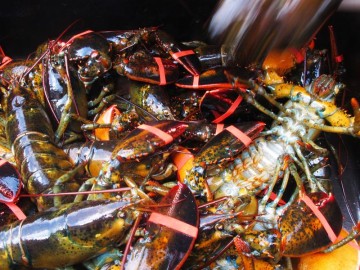 Maine’s congressional delegation on Monday asked the Obama administration to resist efforts to ban the import of live Maine lobsters by European Union countries, saying the discovery of American lobsters in Swedish waters doesn’t warrant such harsh measures. “Since only a small number of Maine lobsters have been found in foreign waters, we believe regulators should take a more finely tuned approach before calling this an ‘invasion,'” Sens. Susan Collins and Angus King and Reps. Chellie Pingree and Bruce Poliquin wrote in the letter. Read the rest here 08:08
Maine’s congressional delegation on Monday asked the Obama administration to resist efforts to ban the import of live Maine lobsters by European Union countries, saying the discovery of American lobsters in Swedish waters doesn’t warrant such harsh measures. “Since only a small number of Maine lobsters have been found in foreign waters, we believe regulators should take a more finely tuned approach before calling this an ‘invasion,'” Sens. Susan Collins and Angus King and Reps. Chellie Pingree and Bruce Poliquin wrote in the letter. Read the rest here 08:08
Opinion: Cashes Ledge decision a victory for open government
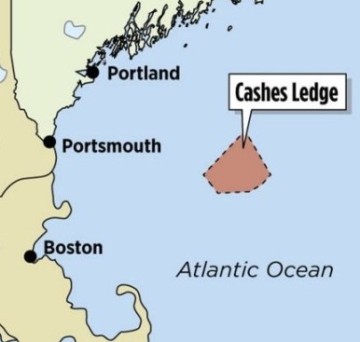 The decision by the Obama administration to pass on a proposal to make a large swath of the Gulf of Maine a national monument is not only a victory for fishermen. It’s also a win for those who favor open government. News came late last week that the administration would not, in fact, use the federal Antiquities Act to make the area around Cashes Ledge a permanent “maritime national monument” by executive decree. The environmental lobby is not abandoning its efforts. Read the rest here 07:49
The decision by the Obama administration to pass on a proposal to make a large swath of the Gulf of Maine a national monument is not only a victory for fishermen. It’s also a win for those who favor open government. News came late last week that the administration would not, in fact, use the federal Antiquities Act to make the area around Cashes Ledge a permanent “maritime national monument” by executive decree. The environmental lobby is not abandoning its efforts. Read the rest here 07:49
Sitka tribe asks state regulators to shut down commercial herring fishery
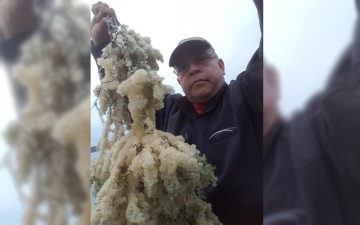 Sitka Tribe of Alaska is asking state fishing regulators to end the current commercial harvest of herring near the Southeast community, saying too many of the tiny fish are being caught and it’s hurting the tribe’s traditional reliance on herring eggs. Tribal chairman Mike Baines wrote a letter to Fish and Game Commissioner Sam Cotton today asking that he “cease any additional attempt” by the commercial fishing division to allow more herring to be caught in the Sitka sac roe herring fishery. A Fish and Game update on the Sitka Sound herring fishery on Saturday said approximately 10,050 tons had been harvested since this season started on March 17. That leaves about 4,690 tons left to be harvested. Read the rest here 19:06
Sitka Tribe of Alaska is asking state fishing regulators to end the current commercial harvest of herring near the Southeast community, saying too many of the tiny fish are being caught and it’s hurting the tribe’s traditional reliance on herring eggs. Tribal chairman Mike Baines wrote a letter to Fish and Game Commissioner Sam Cotton today asking that he “cease any additional attempt” by the commercial fishing division to allow more herring to be caught in the Sitka sac roe herring fishery. A Fish and Game update on the Sitka Sound herring fishery on Saturday said approximately 10,050 tons had been harvested since this season started on March 17. That leaves about 4,690 tons left to be harvested. Read the rest here 19:06
Aging oil rigs spark debate: removal or reef?
 Twenty-three rigs sit in federal waters off California’s coast, nearing the end of their life spans. BOEM expects them to soon stop producing oil — and, technically, federal leases require companies to completely remove decommissioned rigs. The California Marine Resources Legacy Act provides a loophole, allowing companies an exemption if there is a “net” environmental benefit to leaving the rigs as reefs. To proponents, the option is a win-win: The fish get to live, and companies will donate some of their significant savings to marine conservation. The debate often centers on a scientific question: Do rigs provide beneficial habitat, or do they just attract marine life passing through? Read the rest here 16:54
Twenty-three rigs sit in federal waters off California’s coast, nearing the end of their life spans. BOEM expects them to soon stop producing oil — and, technically, federal leases require companies to completely remove decommissioned rigs. The California Marine Resources Legacy Act provides a loophole, allowing companies an exemption if there is a “net” environmental benefit to leaving the rigs as reefs. To proponents, the option is a win-win: The fish get to live, and companies will donate some of their significant savings to marine conservation. The debate often centers on a scientific question: Do rigs provide beneficial habitat, or do they just attract marine life passing through? Read the rest here 16:54






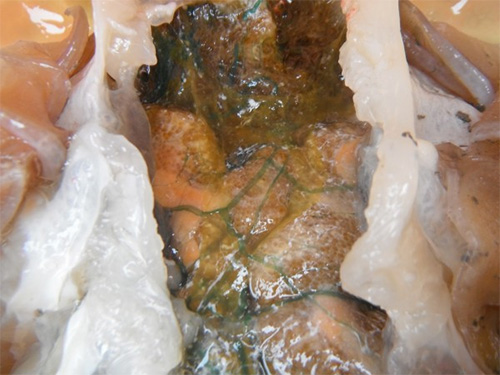 Nobody knows how the parasitic barnacles create zombie crabs. King crabs, already otherworldly-looking creatures, grow even stranger when barnacles invade them. The insides of infected crabs become filled with green, branching tendrils that resemble plant roots more than anything. Barnacles are marine animals with outer shells, related to crabs and lobsters. Typically, they live on rocks or the sides of boats, filtering food out of the water. However, Briarosaccus barnacles infect king crabs, turning them into “zombie” crabs that raise and nurture the parasite’s eggs. The mechanisms behind this control are unknown. SitNews
Nobody knows how the parasitic barnacles create zombie crabs. King crabs, already otherworldly-looking creatures, grow even stranger when barnacles invade them. The insides of infected crabs become filled with green, branching tendrils that resemble plant roots more than anything. Barnacles are marine animals with outer shells, related to crabs and lobsters. Typically, they live on rocks or the sides of boats, filtering food out of the water. However, Briarosaccus barnacles infect king crabs, turning them into “zombie” crabs that raise and nurture the parasite’s eggs. The mechanisms behind this control are unknown. SitNews 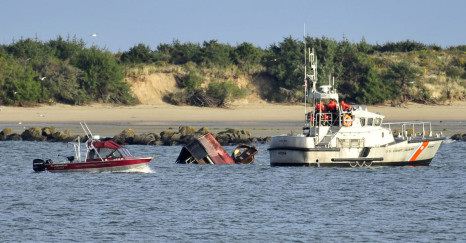 Six days have passed since the Patty AJ capsized in the Coos Bay channel near buoy 5, and the search for its missing skipper has ended. Now the task of raising the ship has begun, and a commercial salvage operation is currently underway to lift the vessel off the bottom of the bay and tow it into shallow water. The Coast Guard looked for Jerry Barkley, the replacement captain for the 62-foot steel fishing vessel, for 12 hours before suspending the search. Lt. Kevin St. Pierre said a survival model was used to help them decide how long the search should go on, which included what clothes Barkley was wearing and the water temperature.
Six days have passed since the Patty AJ capsized in the Coos Bay channel near buoy 5, and the search for its missing skipper has ended. Now the task of raising the ship has begun, and a commercial salvage operation is currently underway to lift the vessel off the bottom of the bay and tow it into shallow water. The Coast Guard looked for Jerry Barkley, the replacement captain for the 62-foot steel fishing vessel, for 12 hours before suspending the search. Lt. Kevin St. Pierre said a survival model was used to help them decide how long the search should go on, which included what clothes Barkley was wearing and the water temperature. 